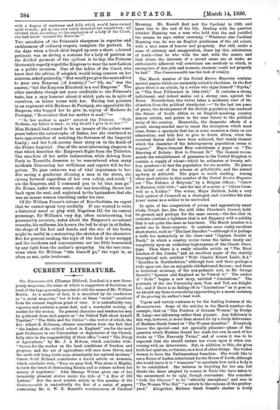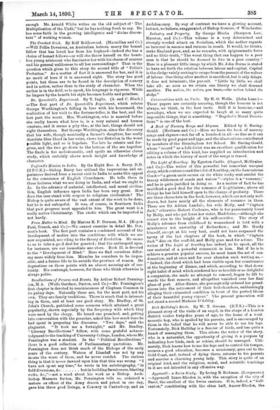CURRENT LITERATURE.
The Commonwealth (Thomas Hibberd, London) is a new three- peany magazine, the name of which is suggestive of Socialism, at least of the type generally associated with the name of Mr. William Morris. As a matter of fact, it is described by its conductors as "a social magazine," but it looks at these "social" questions from the earnest Anglican point of view. It is undoubtedly very vigorous and contains a great deal, and a wonderful variety, of matter for the money. Its general character and tendencies may be gathered from such papers as "An Oxford Talk about Arnold Toynbee," "The Bible and the Critics "—the writer of which, the Rev. Albert E. Robinson, obtains consolation from the fact that "the leaders of the critical school in England" are for the most part Professors in our Universities or dignitaries of the Church, fully alive to the responsibility of their office "—and " The Decay of Agriculture," by Mr. J. A Hobson, which concludes with : "Secure for the worker on the land conditions of freedom and progress, and the art of agriculture will once more thrive, and the earth will bring forth more abundantly her natural increase." Canon Scott Holland contributes a fervid article on Armenia, which concludes with, "Ever we pray God, Who alone is Mighty, to turn the heart of obstructing Russia and to release us from her misery of impotence." John Strange Winter gives one cf her invariably pleasant stories under the title of "A Box of Old Letters." But the most notable article in this number of the Commonwealth is undoubtedly the first of a series of papers containing Mr. G. W. E. Russell's reminiscences of Cardinal Manning. Mr. Russell first met the Cardinal in 1883, and knew him to the end of his life. Dealing with the question whether Manning was a man who held that the end justified the means, he says, rather curiously, "Whatever else Cardinal Manning was, he was an English gentleman of the old school, with a nice sense of honour and propriety. But still, under a mass of calumny and exaggeration, there lay this substratum of truth—that he who wills the end, wills the means, and that where the interests of a sacred cause are at stake, an enthusiastic adherent will sometimes use methods to which, in enterprises of less pith and moment, recourse could not properly be had." The Commonwealth has the look of vitality.
The March number of the United Service Magazine contains several papers which are eminently suited to the times. In the first place there is an article, by a writer who signs himself " Styrka," on "The Boer Filibusters in 1884-1885." It contains a strong indictment, and indeed makes out a strong case, against the Boers. Nevertheless, this writer takes a moderate view of the situation from the political standpoint :—" In the last ten years of peace, the development of the British population has rendered the future of South Africa as an English-speaking country almost certain, and points in the near future to the political unity of the country. Meanwhile, the desperate efforts of a proud, strong-minded race to resist the absorption which must come, forms a spectacle that has in some measure a claim on our admiration ; and bids fair to give to South Africa, when the eventual fusion shall have been achieved, that steady element which the character of the heterogeneous population seems to require." Major-General Rice contributes a paper on " The Starving of Britain : How to Prevent It." The General recom- mends the establishment of granaries in the United Kingdom to contain a supply of wheat—which he estimates at twenty mil- lion quarters—to last the population for six months. He places the initial cost of the scheme at £28,000,000, and the annual up-keep at .£100,000. The paper is worth reading. Among other good articles in this number of the United Service Magazine are "The Defence of Belgium," by a Belgian Officer ; "Carew in Munster, 1600 1603 ; " and the last of a series ,n "Oliver Crom- well as a Soldier." The writer, Major Baldock, holds a very high opinion of Cromwell as a strategist, and considers his nine years' career as a soldier to be unrivalled.
In spite of the competition of young and aggressively smart rivals, Temple Bar, like the still older Chambers's Journal, holds its ground, and perhaps for the same reason,—the fact that its contents combine a lightness that is not flippancy with a solidity that is not quite the same as heaviness. The March number is a model one in these respects. It contains some really excellent short stories, such as "The Last Sacrifice "—although it is perhaps a trifle too melancholy at the close—and "Captain Scarlet at Fault," in which a country rector turns the tables neatly and completely upon an audacious highwayman of the Claude Duval type. Then there is a really valuable article on "The Rival Leaders of the Czechs," and an excellent paper of the chattily biographical sort, entitled "With Charles Robert Leslie, RA." "Rambles in Hertfordshire," although here and there perhaps a trifle spun out, has an enjoyable old-fashioned flavour; and there is historical accuracy, of the non-pedantic sort, in Mr. George Serrell's " Spenser and England as he Viewed it." The author of " Dodo " begins a new story, entitled "Limitations." The portraits of the two University men, Tom and Ted, are delight- ful; and if there is no falling-off in "Limitations" as it goes on, we should say there is something approaching to a moral certainty of its proving its author's best work.
Vigour and variety continue to be the leading features of the Humanitarian. Some of the articles in the March number—for example, that on "The Position of German Women," by Evelyr M. Lang—are informing rather than piquant. Any deficiency in this way, however, is more than atoned for by a lively deliverance of Madame Sarah Grand on "The Woman Question." Everybody knows the special—and not specially pleasant—phase of this question which Madame Grand has made her own in such of her works as "The Heavenly Twins," and of course it was to be expected that she should restate her views upon it when con- versing with an interviewer. But, in addition to this, she gives forth her opinions, or fancies, on a host of other things. She wishes women to have the Parliamentary franchise. She would like to see a House of Ladies substituted for the House of Lords, although she would leave it to " wiseacres " to ascertain how such a body is to be established. She believes in bicycling for her sex, but thinks the dress adopted by women in Paris who have taken to the amusement to be ugly, though convenient. She considers "Jude the Obscure" to be "ethically amorphous," and sees in "The Woman Who Did" "a return to the customs of the poultry- yard." Altogether, Madame Sarah Grand's chatter is lively
enough Mr. Arnold White writes on the old subject of The Multiplication of the Unfit," but he has nothing fresh to say. He has some faith in the growing intelligence and "divine discon- tent" of working women.







































 Previous page
Previous page